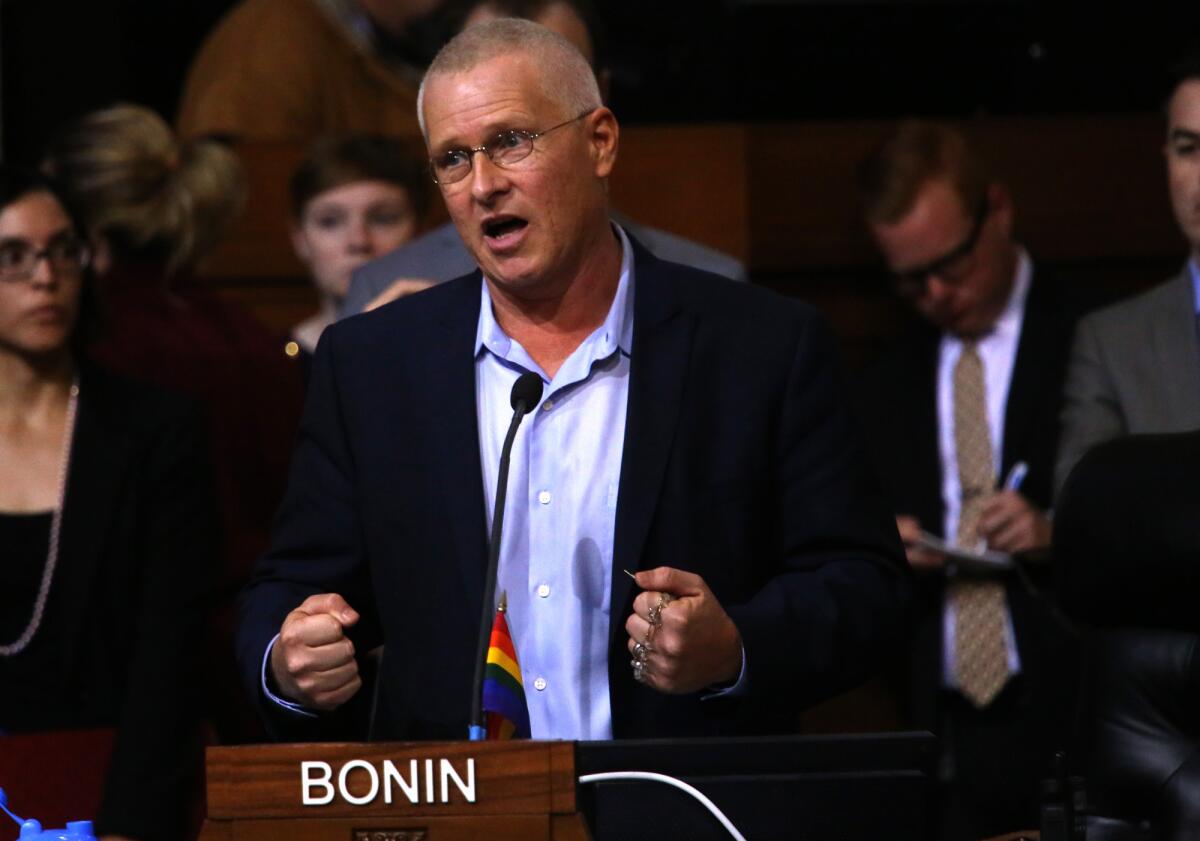L.A. proposal would block Airbnb hosts from creating ‘rogue hotels’

Councilman Mike Bonin, shown in May, said by imposing short-term stay restrictions, the city would protect genuine “home sharing” while cracking down on speculators who buy up properties to rent out like “rogue hotels.”
- Share via
Two Los Angeles lawmakers are proposing new regulations to bar people from renting out houses or apartments for short stays if the home is not their primary residence — a rule aimed at preventing local housing from being bought up and operated like hotels.
“We cannot tolerate how a growing number of speculators are eliminating rental housing and threatening the character of our neighborhoods,” City Councilman Mike Bonin said Tuesday.
The measure, introduced by Bonin and Council President Herb Wesson, is aimed, in part, at rentals brokered through websites such as Airbnb. Their explosive popularity has pitted the companies and a newly organized network of hosts against housing advocates, neighborhood activists and hotel unions worried about the effects of the rapid rise.
Under the proposed rules, Angelenos could rent out a spare room, back house or a whole house or apartment for short stays, as long as it was their primary residence. Unlike neighboring Santa Monica, which recently adopted some of the strictest regulations in the nation, L.A. would allow someone to rent out their own home while out of town.
However, Angelenos could not rent out any home that was not their main residence for short stays, nor any unit that is covered by rent control. By imposing those restrictions, Bonin argued that the city would protect genuine “home sharing” while cracking down on “rogue hotels.” The proposed rules also would require short-term rentals to collect the same kind of city taxes as hotels.
Rental hosts have praised platforms such as Airbnb for providing them both an economic lifeline and a way to share a slice of their lives with travelers. But the phenomenon of commercial owners renting out entire homes or apartment buildings has stirred alarm about rental units being pulled off the market.
“No one is opposed to home sharing,” Venice resident Linda Lucks said at a council meeting Tuesday. However, “kicking out residents and long-term tenants who’ve been there for years in order to make a bigger buck is not home sharing.”
Airbnb has repeatedly said that the vast majority of its L.A. hosts are the “primary residents” of the homes they list, using the platform to help make ends meet. In reaction to the new proposal, a company spokeswoman said Tuesday that although many details remain to be worked out, the plan appears promising.
“This proposal demonstrates L.A. is embracing home sharing and the peer-to-peer economy,” Airbnb spokeswoman Alison Schumer said.
But a representative of the Los Angeles Short Term Rental Alliance, which includes rental owners and operators, said the plan was too “one-size-fits-all.”
Vacation rentals are “part of the fabric of Los Angeles, and they’re getting shortchanged,” said Robert St.Genis, its director of operations. He said members of his group were especially concerned about how the city would define a “primary residence” for someone who splits their time between different places.
Bonin and Wesson also want the city to back a proposed state law, SB 593, that would require Airbnb and other online rental platforms to report the addresses, number of nights rented and amount paid for such rentals to cities and counties. Airbnb has balked at that idea, saying it would be a violation of user privacy.
“It’s not the city’s job to stifle this kind of innovation,” said Harvey Slater, a rental host who testified at a city council meeting Tuesday against backing the state law.
Bonin and other supporters counter that cities cannot enforce any rules without the requested information, which does not include personal data such as renters’ names. Under existing city codes, renting out rooms or a whole home for short stays already is illegal in most residential stretches of Los Angeles. But city officials have said it is extremely challenging to enforce the rules, partly because many websites do not list rental addresses.
Follow @latimesemily for what’s happening at Los Angeles City Hall
More to Read
Sign up for Essential California
The most important California stories and recommendations in your inbox every morning.
You may occasionally receive promotional content from the Los Angeles Times.











